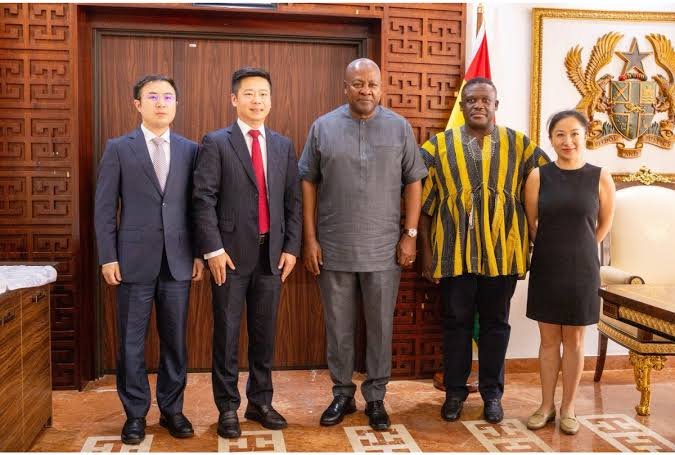Huawei Pledges Support for Ghana’s Digital Transformation in Meeting with President Mahama
ACCRA – President John Dramani Mahama has held high-level discussions with a delegation from technology giant Huawei, focusing on accelerating Ghana’s digital transformation agenda through enhanced connectivity, cloud computing infrastructure, and digital skills development. The meeting at the Jubilee House signals renewed commitment to public-private partnerships in advancing Ghana’s position as a digital hub in West Africa.
The Huawei delegation, led by the company’s Country Director, was accompanied by the Minister for Communications, Digital Technology and Innovations, Sam Nartey George, highlighting the strategic importance both parties place on the collaboration. The discussions centered on practical initiatives to bridge Ghana’s digital divide while strengthening the country’s technological sovereignty and infrastructure resilience.
Strategic Partnership for Digital Infrastructure Development
The high-level meeting represents a significant step in Ghana’s ongoing efforts to leverage international technology partnerships for national development. According to detailed reporting from Tech Africa News, the discussions emphasized Huawei’s commitment to supporting key pillars of Ghana’s digital economy, including the expansion of rural telephony networks, deployment of critical ICT infrastructure, and development of cloud computing capabilities.
“The discussions highlighted Huawei’s commitment to supporting Ghana’s digital transformation agenda, focusing on connectivity, cloud computing, and digital skills development. The delegation and government officials also explored initiatives to expand rural telephony networks, enhance digital sovereignty, and deploy critical ICT infrastructure to support national development.”
The partnership aligns with Ghana’s broader digitalization strategy, which views technology as a critical enabler for economic growth, job creation, and improved public service delivery. The emphasis on rural connectivity addresses one of Ghana’s persistent challenges—the urban-rural digital divide—which has limited economic opportunities in remote communities and hindered inclusive development.
This strategic engagement between the Ghanaian government and Huawei represents a significant development in the country’s technology landscape. For comprehensive coverage of this and other important national stories, readers can follow updates through reliable sources like African News Desk’s Ghana news section, which provides detailed reporting on matters of technological advancement and economic development.
Building Ghana’s Digital Future Through Skills and Innovation
Beyond infrastructure development, the meeting placed significant emphasis on human capital development and digital skills training for Ghanaian professionals. Huawei reaffirmed its vision to help position Ghana as a digital hub in Africa through investments in artificial intelligence, cloud computing, and specialized training programs designed to equip young Ghanaians with competitive technological skills.
The focus on skills development acknowledges that technological infrastructure alone cannot drive digital transformation without corresponding investment in human capabilities. This approach aligns with global best practices in digital development, where successful technology adoption requires building local expertise and creating sustainable ecosystems of innovation and maintenance.
“The visit reinforced the government’s strategy of aligning private sector innovation with national policy priorities, emphasizing the role of technology in creating inclusive opportunities, strengthening security systems, and driving economic growth. Huawei reaffirmed its vision to help position Ghana as a digital hub in Africa through investments in ICT infrastructure, AI, cloud computing, and skills training for young professionals.”
The partnership also addresses digital sovereignty concerns, with discussions exploring how Ghana can maintain control over its digital assets and data while benefiting from international technological expertise. This balanced approach reflects growing awareness among African nations about the importance of preserving national interests in an increasingly digital global economy.
The meeting comes at a critical time for Ghana’s technology sector, which has shown remarkable growth despite global economic challenges. The COVID-19 pandemic accelerated digital adoption across multiple sectors, revealing both the potential and limitations of Ghana’s current digital infrastructure. The collaboration with Huawei aims to address these limitations while building on existing strengths to create a more robust and inclusive digital ecosystem.
Industry analysts note that successful implementation of the discussed initiatives could significantly enhance Ghana’s competitiveness in the regional digital economy. Improved connectivity and cloud infrastructure would support the growing startup ecosystem, enable digital government services, and facilitate the digital transformation of traditional industries such as agriculture, manufacturing, and financial services.
The emphasis on security systems within the digital transformation agenda reflects growing concerns about cybersecurity in an increasingly connected society. As Ghana expands its digital footprint, protecting critical infrastructure and citizen data becomes paramount, requiring advanced technological solutions and expertise that partnerships with global technology leaders can provide.
As Ghana continues its journey toward becoming a digital hub in Africa, the success of such public-private partnerships will depend on effective implementation, transparent governance, and continuous alignment with national development priorities. The meeting between President Mahama and Huawei leadership represents an important milestone in this ongoing process, setting the stage for concrete initiatives that could transform Ghana’s digital landscape in the coming years.
The outcomes of this collaboration will be closely watched by other African nations facing similar digital development challenges, potentially serving as a model for how international technology partnerships can be structured to maximize benefits for host countries while respecting their sovereignty and development priorities.


